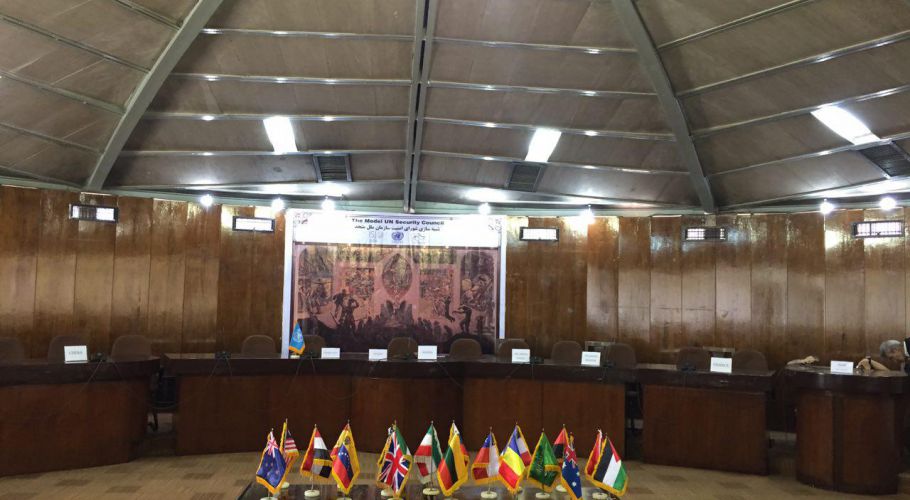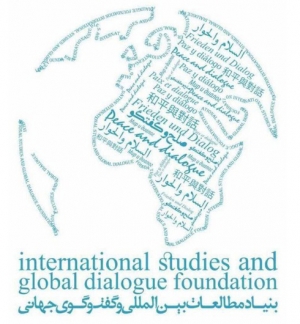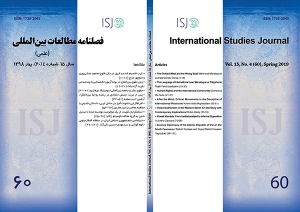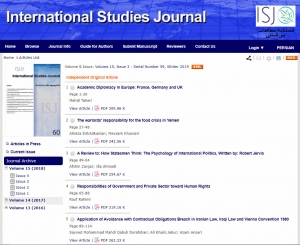ISJ Admin
IURA & Legal Systems Journal: Call for Papers
IURA & LEGAL SYSTEMS JOURNAL
CALL FOR PAPERS
“Ubi Robots Ibi Ius? Le sfide dell’ Intelligenza Artificiale al Diritto”
The journal "Iura & Legal Systems”, edited by the Law School of the University of Salerno, announces the first edition of its Call for Papers for the creation of aspecial issue, available both online and in print.
The aim is to annually engage scholars and experts, both Italian and international, in a scientific debate on a current andcross-cuttingtheme. The subject of this Call for Papers is: “Ubi Robots Ibi Ius? The Challenges of Artificial Intelligence for the Law.”
For more information: Click here
ISJ, Volume 18, Issue 3 - Serial Number 71, Winter 2022
ISJ, Volume 18, Issue 3 - Serial Number 71, Winter 2022
ISJ, Volume 17, Issue 1 - Serial Number 65E, Summer 2020
ISJ, Volume 17, Issue 1 - Serial Number 65E, Summer 2020
For View ISJ 65E
1. The Post-COVID-19 Pandemic World Order: Imposing New Realities /
Mahmood Monshipouri
Pages: 7-26 View PDF
2. Sources of (In)Security in the Persian Gulf /
Mehran Kamrava
Pages: 27-47 View PDF
3. The Civil Union in The Italian Legal System /
Salvatore Mezzanotte
Pages: 49-73 View PDF
4. How to Become a Resilient, Adaptive Leader in Turbulent Times: Lessons from Women in the Middle East /
Wanda Krause
Pages: 75-103 View PDF
5. An Integrated Approach to the Security in The MENA Region /
Safa A. Hussain
Pages: 105-135 View PDF
6. The Impact of Historical Narratives on Ethnic Conflicts in Nagorno-Karabakh, Abkhazia and South Ossetia /
Elaheh Koolaee and Fahimeh Khansari Fard
Pages: 137-168 View PDF
7. Sur le front de la lutte contre les discriminations: l’observation n°18 du Comité des droits de l’homme de l’ONU comme marche à suivre/
Par Emmanuel Bayeni
Pages: 169-187 View PDF
ISJ, Volume 16, Issue 3 - Serial Number 63E, Winter 2020
ISJ, Volume 16, Issue 3 - Serial Number 63E, Winter 2020
For View ISJ 63E
1. From Advocatus Diabolic on the COVID-19 Pandemic to Ethical Concerns & International Relations /
Anja Matwijkiw
Pages 1-54 View PDF
2. The Viability of an Ad Hoc IS Tribunal: Legal-Political Challenges, Implications and Consequences /
Geert-Jan Alexander Knoops
Pages 55-67 View PDF
3. The Strategic Theory of Opportunity Equality and the Triple of Wealth, Power and Knowledge /
Farid Azadbakht
Pages 69-86 View PDF
4. Never Again? Learning from September 11 to Improve Tomorrow’s Strategic Intelligence /
Jenny K. Wright
Pages 87-126 View PDF
5. Anti-ISIS and Anti-Western: An Examination of Comments on ISIS Counter Narrative Facebook Videos /
Anne Speckhard, Molly Ellenberg, Haider Shaghati and Neima Izadi
Pages 127-156 View PDF
6. Turkish Geopolitical Thought: Problems of Genesis (1990s) /
Ruben Safrastyan
Pages 157-17 View PDF
Establishment of the International Studies and Global Dialogue Foundation in 2019
Establishment of the International Studies and Global Dialogue Foundation in 2019
More Info: Telegram Channel of International Studies and Global Dialogue Foundation:
International Studies and Global Dialogue Foundation works whit ISJ.
ISJ, Volume 16, Issue 2 - Serial Number 62, Autumn 2019
ISJ, Volume 16, Issue 2 - Serial Number 62, Autumn 2019
For View ISJ 62 Click here
1. The Dominant Regional Trends and the Future of Order in the Middle East
Pages 7-29
Ghasem Toraby; Mohammad Naser Taheri zadeh
2. Symbolic Policy of the Council of Europe’s Cybercrime Treaty
Pages 31-47
Elnaz Katanchi; Babak Pourghramani
3. Trial of Piracy Defendants in the International Criminal Court (ICC)
Pages 49-69
Seyyed sajjad Kazemi; Sajjad Heidari
Pages 71-91
Mehdi Hedayati Shahidani; Javad Ramazanpoor Shalmani
5. The Food Security Crisis in Venezuela and the Role of the Parties Involved in the Crime
Pages 93-113
Meysam Khosravi; Alireza Erik Adkanian
Pages 115-142
Jamal Beigi; Hamid Ashena
English Abstract No. 62ISJ, Volume 16, Issue 1 - Serial Number 61, Summer 2019
ISJ, Volume 16, Issue 1 - Serial Number 61, Summer 2019
For View ISJ 61 Click here
Pages 7-30
Somaye Ghanbari
Pages 31-61
Amir Sadra Javanshiri; Mohammad Ali Bbasiri
Pages 83-102
َAlireza Niazmand
5. Explaining Israel's Strategic Position in US Arms Policy in the Middle East
Pages 103-125
Hamid Dorj; Reza Eltiami Nia
6. The Restorative Justice in Light of the 2002 International Criminal Tribunal of Yugoslavia
Pages 127-155
Hossein Esmaeil Nasab
7. The Survey of Military Politics Effects on Persian Gulf Regional Security
Pages 155-182
Soheil Soheili Najafabadi; Gharineh Kishishian sirki; Mohamadreza Ghaedi; Reza Simbar
English Abstract No. 61
Persian Gulf & Strait of Hormuz
Persian Gulf & Strait of Hormuz
Published on July 30, 2019
Mehdi Zakerian
Professor&Editor-in-Chief ISJ
Here is the Persian Gulf and Strait of Hormuz
Mehdi Zakerian
Prof. of Human Rights and International Relations
A . From the legal perspective:
Iran has stopped a British ship in violation of maritime rules in the Persian Gulf. Britain has seized Iranian oil tanker at the request of the United States in Gibraltar. The EU has ordered sanctions on purchasing oil originated Syria, not selling oil to it. Iran is not a member of the European Union and is free to export its oil to any country which is not sanctioned by the UN Security Council. According to international law and the law of seas, Iranian ship must be released immediately. There is no reason for freeing the British ship which has violated maritime rules in Persian Gulf.
B. From the political perspective:
By the end of the 19th century, Britain was the dominant maritime power of the world. The country still remains one of the most important maritime powers in international community. Britain seizure of an Iranian ship in Gibraltar which has a strategic ally named the United States is a small victory in the above-mentioned system.
But Iran has never been a maritime power. The seizure of a British ship in the Persian Gulf by Revolutionary Guard naval forces is a great loss for Britain and its strategic ally, America and the newly team called "B". Iran's national sovereignty over its territorial waters is an undeniable fact. Harmless crossing of non-hostile ships from the Strait of Hormuz is seriously monitored by Iran.
ISJ, Volume 15, Issue 4 - Serial Number 60, Spring 2019
ISJ, Volume 15, Issue 4 - Serial Number 60, Spring 2019
The Divided West and the Rising East
Mahmood Monshipouri and Manochehr Dorraj
The Language of International Law; Monologue or Polyphonic Test
Farid Azadbakht
Human Rights and the International Community
Domenica De Fazio
After the West: Critical Movements in the Discipline of International Relations
Arshin Adib-Moghaddam
Violent Extremism in the Western Sahel: An Old Story with Contemporary Implications
Robin Hardy
Kuwait Islamists: From Institutionalized to Informal Opposition
Luciano Zaccara
Science Diplomacy of the Islamic Republic of Iran in the South Caucasus
Elaheh Koolaee and Seyed Mehdi Hosseini Taghiabad
For view ISJ 60 Click here and Click on English under the header of Site
ISJ, Volume 15, Issue 3 - Serial Number 59, Winter 2019
ISJ, Volume 15, Issue 3 - Serial Number 59, Winter 2019
Academic Diplomacy in Europe: France, Germany and UK
Prof. Dr. Mehdi Taheri
The warlords' responsibility for the food crisis in Yemen
Alireza ErikAdkanian - MeysamKhosravi
A Review to: How Statesmen Think: The Psychology of International Politics, Written by: Robert Jervis
Prof. Dr. AfshinZargar- Jila Ahmadi
Responsibilities of Government and Private Sector toward Human Rights
Prof. Dr. Rauf Rahimi
Application of Avoidance with Contractual Obligations Breach in Iranian Law, Iraqi Law and Vienna Convention 1980
Ali Khairi.Jebur- Prof. Dr. Sayyed Mohammad Mahdi Qabuli Dorafshan - Prof. Dr. Azam Ansari
For view ISJ 59 Click here and Click on English under the header of Site
Photo Gallary















Who's Online
We have 27 guests and no members online
Support ISJ
-
 International Studies Journal (ISJ) is a private quarterly and it…Read More
International Studies Journal (ISJ) is a private quarterly and it…Read More

Contact Us
You can Contact with Us by these E-Mails :
- Info [at] isj.ir
- Info [at] isjq.net
- Isjqnet[at] gmail.com
Subscription
To subscribe to the journal and get the latest news Click on the link below.
Subscription features:
- Knowledge of regional and international conferences on the subject of law, political science and international relations
- Awareness workshops and also had a scholarly
- Get free magazine for renewing a number of electronic files again
- Electronic access to the journal's website
- Voting rights in policy making and planning Magazine
















